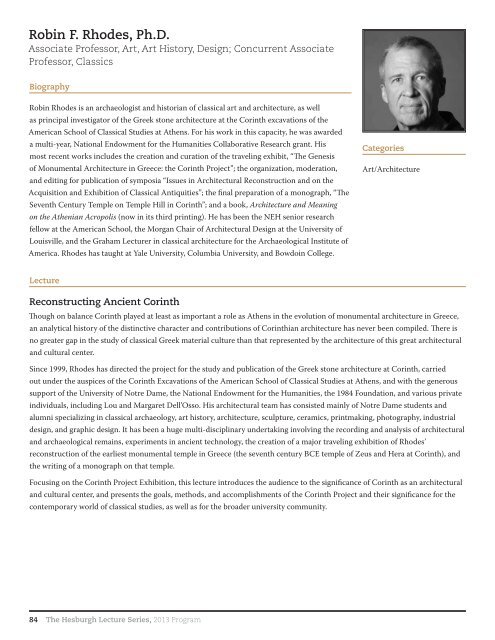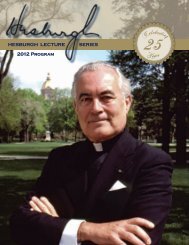HESBURGH LECTURE SERIES 2013 Program - Alumni Association ...
HESBURGH LECTURE SERIES 2013 Program - Alumni Association ...
HESBURGH LECTURE SERIES 2013 Program - Alumni Association ...
Create successful ePaper yourself
Turn your PDF publications into a flip-book with our unique Google optimized e-Paper software.
Robin F. Rhodes, Ph.D.<br />
Associate Professor, Art, Art History, Design; Concurrent Associate<br />
Professor, Classics<br />
Biography<br />
Robin Rhodes is an archaeologist and historian of classical art and architecture, as well<br />
as principal investigator of the Greek stone architecture at the Corinth excavations of the<br />
American School of Classical Studies at Athens. For his work in this capacity, he was awarded<br />
a multi-year, National Endowment for the Humanities Collaborative Research grant. His<br />
most recent works includes the creation and curation of the traveling exhibit, “The Genesis<br />
of Monumental Architecture in Greece: the Corinth Project”; the organization, moderation,<br />
and editing for publication of symposia “Issues in Architectural Reconstruction and on the<br />
Acquisition and Exhibition of Classical Antiquities”; the final preparation of a monograph, “The<br />
Seventh Century Temple on Temple Hill in Corinth”; and a book, Architecture and Meaning<br />
on the Athenian Acropolis (now in its third printing). He has been the NEH senior research<br />
fellow at the American School, the Morgan Chair of Architectural Design at the University of<br />
Louisville, and the Graham Lecturer in classical architecture for the Archaeological Institute of<br />
America. Rhodes has taught at Yale University, Columbia University, and Bowdoin College.<br />
Lecture<br />
Reconstructing Ancient Corinth<br />
Though on balance Corinth played at least as important a role as Athens in the evolution of monumental architecture in Greece,<br />
an analytical history of the distinctive character and contributions of Corinthian architecture has never been compiled. There is<br />
no greater gap in the study of classical Greek material culture than that represented by the architecture of this great architectural<br />
and cultural center.<br />
Since 1999, Rhodes has directed the project for the study and publication of the Greek stone architecture at Corinth, carried<br />
out under the auspices of the Corinth Excavations of the American School of Classical Studies at Athens, and with the generous<br />
support of the University of Notre Dame, the National Endowment for the Humanities, the 1984 Foundation, and various private<br />
individuals, including Lou and Margaret Dell’Osso. His architectural team has consisted mainly of Notre Dame students and<br />
alumni specializing in classical archaeology, art history, architecture, sculpture, ceramics, printmaking, photography, industrial<br />
design, and graphic design. It has been a huge multi-disciplinary undertaking involving the recording and analysis of architectural<br />
and archaeological remains, experiments in ancient technology, the creation of a major traveling exhibition of Rhodes’<br />
reconstruction of the earliest monumental temple in Greece (the seventh century BCE temple of Zeus and Hera at Corinth), and<br />
the writing of a monograph on that temple.<br />
Focusing on the Corinth Project Exhibition, this lecture introduces the audience to the significance of Corinth as an architectural<br />
and cultural center, and presents the goals, methods, and accomplishments of the Corinth Project and their significance for the<br />
contemporary world of classical studies, as well as for the broader university community.<br />
84 The Hesburgh Lecture Series, <strong>2013</strong> <strong>Program</strong><br />
Categories<br />
Art/Architecture



